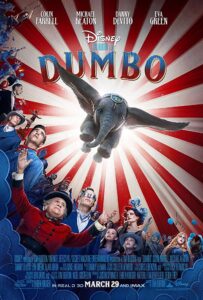Appealing only to the youngest viewers, “Dumbo” will not enchant the rest of us.


Disney’s live-action versions of their animated classics continues to attack cinemas this weekend. With the Tim Burton directed “Dumbo,” we with another crack at the story originally conceived on Roll-A-Book by Helen Aberson and Harold Pearl. Later converted from that format to a 36-page illustrated book entitled “Dumbo the Flying Elephant,” Disney adapted it into a beloved animated 64-minute movie back in 1941. Imagine a 64-minute feature film today? By comparison, Burton’s live-action movie runs a breezy 112 minutes.

For those of you who grew up fondly remembering “Dumbo” and shedding tears, take heart, this new movie won’t tarnish those memories. Unfortunately, it won’t create new ones either. Burton’s bland handling of the material marks a new low for the director, who has always managed to bring a sense of wonder to anything he touches. Sadly, “Dumbo (2019)” is not magical.
When Holt Farrier (Colin Farrell) returns home from World War I, he’s greeted by his two children, Milly (Nico Parker) and Joe (Finley Hobbins). His wife has passed away, and Holt, a one-time horse-riding circus star, has lost his arm in battle. After a moment of adjustment, the kids hug their father, who seems more interested in getting back on a horse than in consoling his two little ones, who have lost their mother and have to deal with an injured father.

The Farriers live with a traveling circus. Visiting towns across the United States by rail, we get a brief sequence that shows the company playing towns from Florida to Missouri. The shame is that we aren’t given examples of those stops that show-off and celebrate circus life, even a highly stylized one. Holt and his wife had an act involving horses. But in his absence, the owner of the company, Max Medici (Danny DeVito), sold the horses to pay bills. The circus has fallen on hard times, and Max has to find a new act to save the business.
Gambling on elephants, Max purchases a pregnant elephant. His hope is that a baby elephant might be an attraction. But when the baby is born, it’s deformed, or, at least, Max thinks so. The baby’s ears are abnormally large. How can he market this strange beast?
Everything about the setup is suspect. Like most of Burton’s work, the world inhabited by the characters is fantastical, a wondrous parallel universe. It’s best to just go with the fantasy aspects of the environment. But this can only go so far.

Once Dumbo’s special gift, that of flight, is revealed, he gains the attention of the unscrupulous entertainment promoter V. A. Vandevere (Michael Keaton, with an intentionally bad toupee). He visits the traveling circus and convinces Max to relocate his group to Coney Island, where they will have a new home. Vandevere’s reasoning is, I suppose, that in order to get the best act, he’ll have to take all of them. It’s best not to think too hard about it, but there are far too many holes in the plan.
So, in no time, the cast is transported to a new circus, an amazing amusement park named Dreamland. And the hope is that Dumbo will be the star performer. Vandevere wants his French acrobat companion, Colette Marchant (Eva Green), to ride Dumbo, as he flies over the crowd. Needless to say things don’t go as planned.

The great misstep in Burton’s “Dumbo” is in placing the focus on the humans and not on the animals. Students of the 1941 film know that the story is chiefly told through talking animals. In Burton’s movie, an elephant can fly, but none of the animals say a word. In fairness, Dumbo does not speak in the 1941 film, but those around him do, including other elephants and particularly Timothy Q. Mouse (voiced by Edward Brophy).
There are homages to the animated classic throughout the new movie, with Milly, a scientist-in-training, keeping a collection of mice. Remember that Timothy Q. Mouse was a critical character in the 1941 version, who eventually becomes Dumbo’s manager. Given the success of 2016’s “The Jungle Book” in which animals were convincingly given voices in an otherwise live-action production (a unique and marvelous hybrid), one wonders why this film decided to keep the animals silent?
While there are no stork deliveries or talking crows, there is a pink elephant scene in this new film. However, this potentially lovely moment doesn’t have any particular connection to the story. It’s a throwaway reference. In 1941, Timothy and Dumbo get accidentally drunk and imagine seeing pink elephants, which is an old reference going on a drunken bender.

But perhaps the biggest disappointment in this version is that key human characters act in cartoonish and frustrating ways. Burton regular, and great comic actor, Michael Keaton is given the thankless task of playing the film’s heavy. It’s a poorly conceived and written role. His weird wig and uneven accent make him more laughable than mysterious. And Keaton, who should have won the Oscar for 2014’s “Birdman,” could have chewed up all the scenery required, providing menace like he did so effectively in “Spider-Man: Homecoming.” But like everything in this film, no time is taken to develop the backstory or make us appreciate anything credibly.
“Dumbo (2019)” adopts an unsophisticated narrative that fails to promote the important, self-reliant moral that made the 1941 adaptation a classic.
To read more about the original story of “Dumbo,” read a blog entry by Jim Korkis on JimHillmedia.com: http://jimhillmedia.com/alumni1/b/wade_sampson/archive/2004/12/27/the-original-story-of-dumbo.aspx
